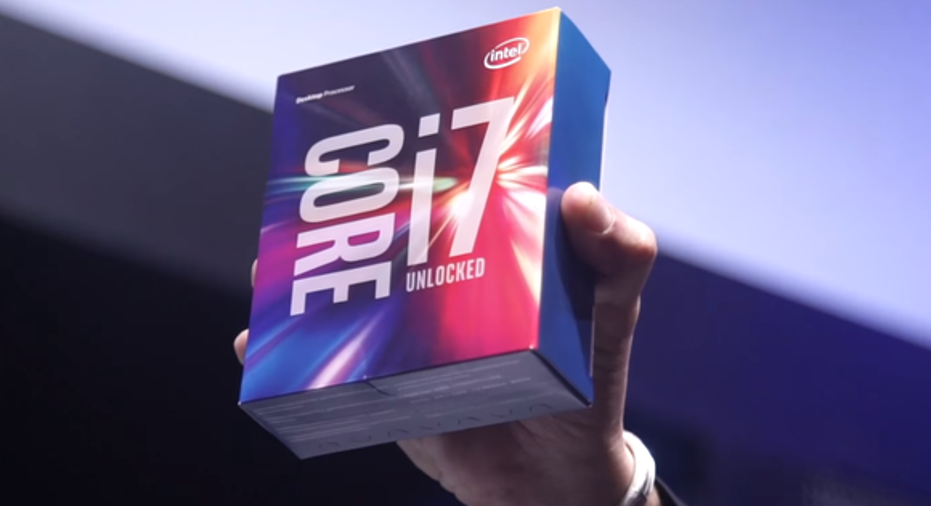Intel Corporation's Core i7 6700K Looks Like a Huge Success

Image source: Author screenshot from Intel YouTube video.
Microprocessor giant Intel , which derives the majority of its revenue from sales of chips into personal computers, has had to face the grim reality of a generally weak personal computer market for several years now. In 2011, worldwide personal computer shipments came in at 352.4 million, according to research firm IDC. In 2015, IDC says that personal computer shipments came in at just 276.2 million.
Intel expects that personal computer sales will, once again, decline in 2016.
Although the overall personal computer market has been weak, there have been sub-segments of the market that have actually grown. One example of such a sub-segment that Intel routinely cites is the market for gaming/enthusiast-oriented PCs.
"For the year, high-end Core i7 microprocessors and our K [stock keeping units] for gaming both set all-time volume records, leading to our rich product mix," Intel CEO Brian Krzanich told investors during the company's conference call to discuss its 2015 financial results.
It would seem that the company's Core i7 6700K chip, targeted at PC enthusiasts and gamers, could help the company report strong shipments for its gaming-oriented K-series chips again this year, even as overall PC sales are expected to slump.
Several pieces of evidence
Although these K-series chips are often sold as parts of complete systems, many buyers of such chips actually build their own computers. As a result, I believe that a nontrivial portion of the company's total K-series chip shipments are actually sold as stand-alone components to end users through retail channels.
According to Newegg.com, a popular reseller of computer components (particularly to enthusiasts and gamers), 87% of customer reviews for the Core I7 6700K were five eggs (Newegg allows users to rate products on a 1-5 egg scale, with 1 being the worst and 5 being the best). Eight percent of reviewers gave it 4 eggs, and just 5% of reviewers gave it between a 1 and a 3. There are 381 total reviews.
The lower-end and lower-priced Core i5 6600K has also gotten very positive reviews, with the distribution of reviews on a 1-5 scale nearly identical to that of the 6700K (I suspect the one point difference between the percentage of 5 egg reviews -- 87% versus 88% -- is due to rounding). What I find interesting though is that the total number of reviews for the 6600K sits at 230, well below the number of reviews for the 6700K.
This might suggest that the more powerful, but pricier, Core i7 6700K is a more popular product than the less powerful, but cheaper Core i5 6600K. However, to have confidence in this conclusion we need more evidence.
Amazon.com, another popular online reseller of computer components, has a page in which it ranks the best-selling products in a given category. The Core i7 6700K is Amazon's best seller in the desktop CPU category, with the Core i5 6500 coming in second place and the 6600K coming in third place.
At this point, if Intel came out and said that the 6700K has been a better seller than the cheaper 6600K overall, I wouldn't doubt it.
Why is this segment so successful?
One of the major problems that seems to be bogging down the personal computer industry as a whole is the idea of "good enough" computing. PCs aren't cheap items, so the average consumer is likely only going to want to upgrade to a new system -- be it a laptop or a desktop -- if she or he needs to.
Gamers and PC enthusiasts are different, though. While I do think there's a reasonable number of people out there who buy new processors because they just want new processors, I believe that gamers by-and-large still buy new components/computers out of need rather than want.
The main difference, though, is that gamers and other types of high end users tend to have workloads that grow in complexity and require more performance over time. This means that their current systems naturally become inadequate sooner, spurring upgrades.
Additionally, I think that the reason Intel sells such a rich mix of products to these gamer/enthusiast customers is that these customers will see both immediate and longer-term benefits from a more expensive product.
In the immediate term, the faster processor should run performance-intensive, such as games, better. Longer-term, a faster processor is likely to remain relevant for longer, meaning that the user might not have to upgrade as soon.
The article Intel Corporation's Core i7 6700K Looks Like a Huge Success originally appeared on Fool.com.
Ashraf Eassa owns shares of Intel. The Motley Fool owns shares of and recommends Amazon.com. The Motley Fool recommends Intel. Try any of our Foolish newsletter services free for 30 days. We Fools may not all hold the same opinions, but we all believe that considering a diverse range of insights makes us better investors. The Motley Fool has a disclosure policy.
Copyright 1995 - 2016 The Motley Fool, LLC. All rights reserved. The Motley Fool has a disclosure policy.



















